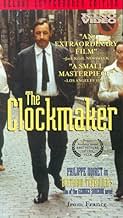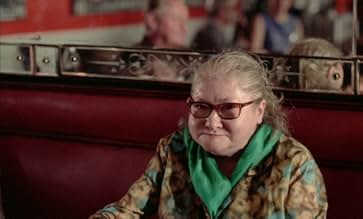IMDb RATING
7.1/10
3.1K
YOUR RATING
A watchmaker finds out one day that his son has become a murderer. He tries to understand for whom and why.A watchmaker finds out one day that his son has become a murderer. He tries to understand for whom and why.A watchmaker finds out one day that his son has become a murderer. He tries to understand for whom and why.
- Awards
- 4 wins & 1 nomination total
7.13.1K
1
2
3
4
5
6
7
8
9
10
Featured reviews
Lyons is the star of the film
The star of this film is the city of Lyons, which looks absolutely magnificent. The problem with the film is that it rambles along until the son is finally captured and tried, and is reconciled with his father. The father doesn't seem to know what's going on at the start or how he feels about his son, before eventually deciding that he wants him to escape. But the film just seems to drift from one encounter to another, with the policeman, with his friend, with the press, with his son's girlfriend's workmates, with the woman who helped bring his son up. Perhaps the director is trying to show what it's like to be waiting for news in such a situation and the sense of not being able to do anything about it. Philippe Noiret and Jean Rochefort are both excellent in portraying sympathetic characters. The son and girlfriend are also portrayed as sympathetic - although we are never explicitly told why they committed the murder, their victim is shown to have been a nasty piece of work. The almost documentary style is in contrast to the cinematic style of other Simenon adaptations such as "Monsieur Hire" and "The Hatter's Ghost". No intrusive music as in "Monsieur Hire" for example.
Brilliant political drama
This film is a brilliant portrayal of a man caught between his private memories of a fugitive son and the political interpretations of his son's actions. There is a constant interplay between Michel Descombes's private existence, individualized profession (as an artisan, he is necessarily the opposite of a mass producer), and the public spectacle that his son has become. It is truly a fascinating commentary on subversion and freedom, wonderfully played by Noiret and other greats, that provides incredible emotional depth.
A Fine, Acute Dramatic Exercise
The Clockmaker is a technically well-crafted precision endeavor in direction, writing, and acting. Director Bertrand Tavernier fashions a subtle, conservative character study asserted into the framework of a crime story, a study of an aging, middle-class clockmaker with a downcast disposition, played, or rather inhabited, by Philippe Noiret. This commonplace man is stunned out of his sluggishness when he finds out that his only son has been arrested for murder.
What is poignant about this story, and what improves the usually dormant drama of a crime film, is that Noiret lives quietly, alone with his son, who is almost grown up. In other words, his son is his whole tranquil life. Yet, when a detective played by mulishly tenacious Jean Rochefort asks him for help with the case, Noiret grasps how little he knows about his son, and struggles with his feeling that he is unable to blame him.
The film opens on Noiret having a night out, when his friends crack wise on the elections, the leftists, a protest rally, and the death penalty. He has fun this night. The next day two policemen come to his shop and rummage around his adjoining apartment. They particularly search his son's room before taking him to the police station where Rochefort tells him his son is wanted for murder of a security guard at the place where his girlfriend was fired, and has not been apprehended. There was even an eyewitness.
Tavernier puts Noiret's character through a motley crew of odd dramatic angles aside from just the press, who are of course just interested in ratings, but also tangents to the main thread of the film like right-wing hooligans who vandalize his window and two girls who confirm how vile the murdered guard was to women. The skillful essence of the film is in the abstractness of it, giving us impressions of how much his relationship with his son means to him, and how bewildered he is that he has no idea what to do to help his son, such as in his transit back home from the precinct and can't stand without feeling ill and has to ask a passenger for his seat.
The film is not hard-hitting enough to be great, but it serves its locale with an authentic atmosphere. The story itself, no matter how well it poignantly portrays a world in miniature, is nevertheless very slight. On the whole, The Clockmaker is a dramatic exercise. As many other French films from the 1960s and '70s were, it is less about telling the story and more about technique. It doesn't compare to the boisterousness and self-consciousness of most of the New Wave films of that time, and in fact is a particularly subtle film. It is essentially a film that says of film-making, "Yes, less is more."
What is poignant about this story, and what improves the usually dormant drama of a crime film, is that Noiret lives quietly, alone with his son, who is almost grown up. In other words, his son is his whole tranquil life. Yet, when a detective played by mulishly tenacious Jean Rochefort asks him for help with the case, Noiret grasps how little he knows about his son, and struggles with his feeling that he is unable to blame him.
The film opens on Noiret having a night out, when his friends crack wise on the elections, the leftists, a protest rally, and the death penalty. He has fun this night. The next day two policemen come to his shop and rummage around his adjoining apartment. They particularly search his son's room before taking him to the police station where Rochefort tells him his son is wanted for murder of a security guard at the place where his girlfriend was fired, and has not been apprehended. There was even an eyewitness.
Tavernier puts Noiret's character through a motley crew of odd dramatic angles aside from just the press, who are of course just interested in ratings, but also tangents to the main thread of the film like right-wing hooligans who vandalize his window and two girls who confirm how vile the murdered guard was to women. The skillful essence of the film is in the abstractness of it, giving us impressions of how much his relationship with his son means to him, and how bewildered he is that he has no idea what to do to help his son, such as in his transit back home from the precinct and can't stand without feeling ill and has to ask a passenger for his seat.
The film is not hard-hitting enough to be great, but it serves its locale with an authentic atmosphere. The story itself, no matter how well it poignantly portrays a world in miniature, is nevertheless very slight. On the whole, The Clockmaker is a dramatic exercise. As many other French films from the 1960s and '70s were, it is less about telling the story and more about technique. It doesn't compare to the boisterousness and self-consciousness of most of the New Wave films of that time, and in fact is a particularly subtle film. It is essentially a film that says of film-making, "Yes, less is more."
Intelligent movie
I'm a big fan of director Bertrand Tavernier. For me, he's the best French director of the past 30 years. This is one of his early works of the seventies and it had all the elements that makes the great personality of his films. Above all : a great sense of reality. Sometimes, his movies looks like they were improvised, but, in fact, it can't really be. This one is like an emotional crescendo. In the begening, we didn't really know what's going on and what kind of man Philippe Noiret is playing. In the middle, we had a great idea, but we don't know that the last minutes will be so full of intense emotions. The great Noiret and Tavernier will make several other movies together. This is one is among the best.
Professional and paradoxical.
L'HORLOGER is faultless. Based on a Simenon novel, it is a measured take on crime, not from the usual point of view of the criminal or the detective, but the waiting father, who must come to terms with his own past and deceptions as a parent.
In avoiding melodrama, the film follows a determinedly unsensational, grey, flat, mundane route. Tavernier rejected the flashiness of the nouvelle vague, in favour of older traditions of French cinema, with emphasis on character, and milieu, meaningful camera movements, and a literate, complex screenplay, while also linking cinematic tradition to his narrative of fathers and sons.
His recreation of Lyons is novel after a decade of Paris overkill, and you can feel the post-1968 political tension, the alarming shift to the right, and the straying of decent men into violence. Phillipe Noiret, one of Europe's greatest actors, is quietly astounding. Everything about the film is as good as it should be. So why, if I may say so under IMDb guidelines, isn't it very interesting?
In avoiding melodrama, the film follows a determinedly unsensational, grey, flat, mundane route. Tavernier rejected the flashiness of the nouvelle vague, in favour of older traditions of French cinema, with emphasis on character, and milieu, meaningful camera movements, and a literate, complex screenplay, while also linking cinematic tradition to his narrative of fathers and sons.
His recreation of Lyons is novel after a decade of Paris overkill, and you can feel the post-1968 political tension, the alarming shift to the right, and the straying of decent men into violence. Phillipe Noiret, one of Europe's greatest actors, is quietly astounding. Everything about the film is as good as it should be. So why, if I may say so under IMDb guidelines, isn't it very interesting?
Did you know
- TriviaThe house where Michel meets the old lady who took care of his son is the house where Bertrand Tavernier lived his childhood with his parents during WWII. René Tavernier was a friend of Louis Aragon and Elsa Triolet.
- GoofsAt 33:08' a waiter enters the police station with a tray with four beers. Camera cuts to the adjacent office and when it returns, there are only two beer bottles left.
- Crazy creditsto Jacques Prevert
- ConnectionsEdited into Le documentaire culturel: Le siècle de Simenon (2014)
- How long is The Clockmaker?Powered by Alexa
Details
- Release date
- Country of origin
- Language
- Also known as
- The Clockmaker of St. Paul
- Filming locations
- Production company
- See more company credits at IMDbPro
- Runtime
- 1h 45m(105 min)
- Sound mix
- Aspect ratio
- 1.66 : 1
Contribute to this page
Suggest an edit or add missing content

![Watch Bande-annonce [OV]](https://m.media-amazon.com/images/M/MV5BZTA2YTQxYjYtNTE3NS00NTg0LWFiMjItMzgyMmZjYzdhMTJlXkEyXkFqcGdeQXRyYW5zY29kZS13b3JrZmxvdw@@._V1_QL75_UY281_CR6)































